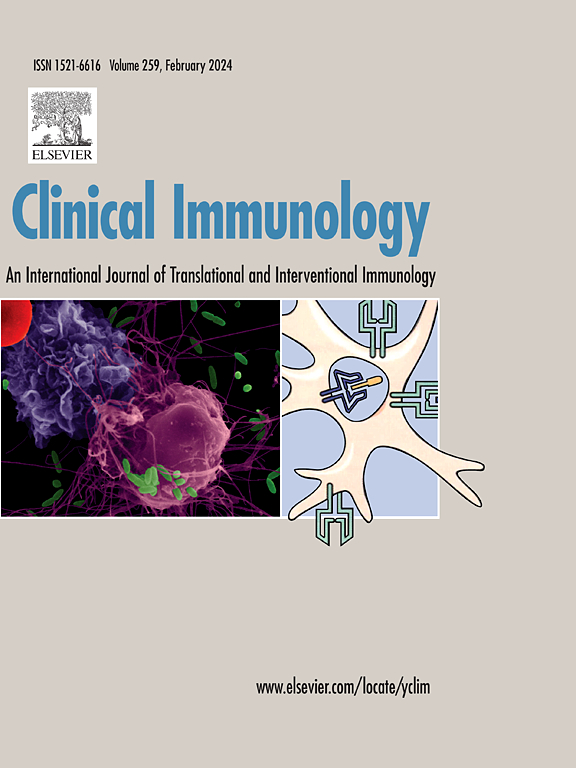LSP1 deficiency increases IL-17-expressing T cells and accelerates primary Sjögren's syndrome
IF 3.8
3区 医学
Q2 IMMUNOLOGY
引用次数: 0
Abstract
Lymphocyte-specific protein-1 (LSP1) is known to negatively regulate T cell migration in autoimmune diseases. However, its role in the development of T cell-dependent Sjögren's syndrome remains unknown. In this study, we found that LSP1 expression was decreased in T cells in salivary glands (SGs) of mice with experimental Sjögren's syndrome, accompanied by enhanced infiltration of leukocytes into SGs. Moreover, Lsp1−/− mice had higher frequency of IL-17A-expressing T cells in cervical lymph nodes as well as increased severity in SGs than WT mice. Concurrently, LSP1 expression was reduced in human T cells of primary Sjögren's syndrome (pSS) patient. Particularly, pSS patients showed an increased Th17 cells, which inversely correlated with LSP1 expression. Taken together, these findings suggest that LSP1 deficiency promote Th17 cell development and exacerbation of pSS. LSP1 might be a potential therapeutic target to regulate Th17 response and to treat autoimmune diseases like pSS.
LSP1缺乏增加表达il -17的T细胞,加速原发性Sjögren综合征。
已知淋巴细胞特异性蛋白-1 (LSP1)在自身免疫性疾病中负性调节T细胞迁移。然而,它在T细胞依赖性Sjögren综合征发展中的作用仍然未知。在本研究中,我们发现实验性Sjögren综合征小鼠唾液腺(SGs) T细胞中LSP1表达降低,并伴有白细胞向SGs的浸润增强。此外,与WT小鼠相比,Lsp1-/-小鼠颈淋巴结中表达IL-17 a的T细胞频率更高,SGs的严重程度也有所增加。同时,LSP1在原发性Sjögren’s综合征(pSS)患者的人T细胞中表达降低。特别是pSS患者Th17细胞增加,与LSP1表达呈负相关。综上所述,这些发现表明LSP1缺失促进Th17细胞的发育和pSS的恶化。LSP1可能是调节Th17反应和治疗pSS等自身免疫性疾病的潜在治疗靶点。
本文章由计算机程序翻译,如有差异,请以英文原文为准。
求助全文
约1分钟内获得全文
求助全文
来源期刊

Clinical immunology
医学-免疫学
CiteScore
12.30
自引率
1.20%
发文量
212
审稿时长
34 days
期刊介绍:
Clinical Immunology publishes original research delving into the molecular and cellular foundations of immunological diseases. Additionally, the journal includes reviews covering timely subjects in basic immunology, along with case reports and letters to the editor.
 求助内容:
求助内容: 应助结果提醒方式:
应助结果提醒方式:


